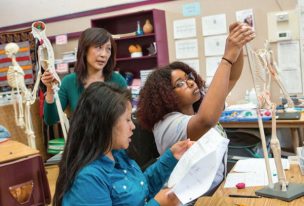Improving Instruction for Newcomer Students
On a late Thursday afternoon, twenty Oakland Unified teachers from across the district are gathered in a classroom at Oakland International High School for the OUSD Newcomer Teacher Scholars inquiry session. They are huddled in small groups—listening to classroom audio recordings, viewing video data, studying newcomer students’ written work.
Each month these teacher scholars bring classroom data to collaboratively analyze in the inquiry sessions led by Mills Teacher Scholars Executive Director, Carrie Wilson. The teacher scholars document their changes in instruction and evidenced-based changes in student learning. Within each of their focused classroom investigations the teacher scholars are searching for answers to the question: How can I better serve my newcomer students’ academic learning?
Over the past two years, OUSD has seen a 122 percent increase in the number of newcomers, and US government officials expect this influx to continue over the next few years. The most recent wave of students include significant numbers of refugee students and Unaccompanied Minors, many of whom are fleeing violence or persecution in their home country and have arrived after enduring an arduous and traumatic journey to the United States. Many of these students have not been to school for years or have had interrupted schooling and require instruction that addresses significant gaps in both literacy and numeracy as well as support in adjusting to a new country, a new language, and a new school system. A recent KQED radio spotlight highlighted the challenges OUSD teachers face in supporting this population of students.
 Through both classroom inquiry and content-focused workshops (beginning in spring 2016), Mills College and OUSD are preparing a cadre of teachers to meet newcomers’ academic and social emotional learning needs. The OUSD Newcomer Teacher Scholars work is a key component of this partnership program between OUSD English Language Learner and Multilingual Achievement (ELLMA) Office and Mills College School of Education, funded by the Walter & Elise Haas Foundation.
Through both classroom inquiry and content-focused workshops (beginning in spring 2016), Mills College and OUSD are preparing a cadre of teachers to meet newcomers’ academic and social emotional learning needs. The OUSD Newcomer Teacher Scholars work is a key component of this partnership program between OUSD English Language Learner and Multilingual Achievement (ELLMA) Office and Mills College School of Education, funded by the Walter & Elise Haas Foundation.
Building on the work of linguist Jeff Zwiers, OUSD is promoting three key instructional strategies for English learner success: fortifying output, academic discussions, and using complex texts. Each teacher in the OUSD Newcomer Teacher Scholars group has chosen an inquiry focus that will help them understand how one of these key practices can support their newcomers’ learning.
At the February Newcomer Teacher Scholars session, Jade Talbot, an English teacher from Castlemont High School, shares video data of her focal students’ conversation. She presents her indicators of success for her warm-up dialogue–the classroom instructional routine that is the focus of her inquiry work. In the daily warm-up, she wants newcomer students to:
- Discuss what they wrote about in their journals.
- Ask follow up questions
- State opinions and make connections.
After viewing the video data, Jade and her colleagues share how they see the indicators of success evidenced in the data. They are able to see growth in the first two areas and Jade wonders aloud about how she might be able to push her focal students towards stating their opinions and making connections, key skills that run across the Common Core standards. After listening to her colleagues discuss potential ways to move forward that are grounded in the video data, Jade decides that her next step will be to more routinely model stating opinions and making connections. She also acknowledges that because she has recently added many new layers of expectations to the interaction, she is uncertain about the timing of when to add this new instructional component.
As Jade and the other teacher scholars leave the meeting, they report feeling buoyed by the collaborative inquiry process. Teachers who seek additional professional learning support have the opportunity to participate in a series of workshops on Language, Culture, and Trauma Pedagogy for Teachers of Newcomers, led by Tomas Galguera, Professor in the School of Education at Mills. The biweekly sessions will address the intersection of language and culture, social emotional development and trauma, and social and legal services for newcomers.


